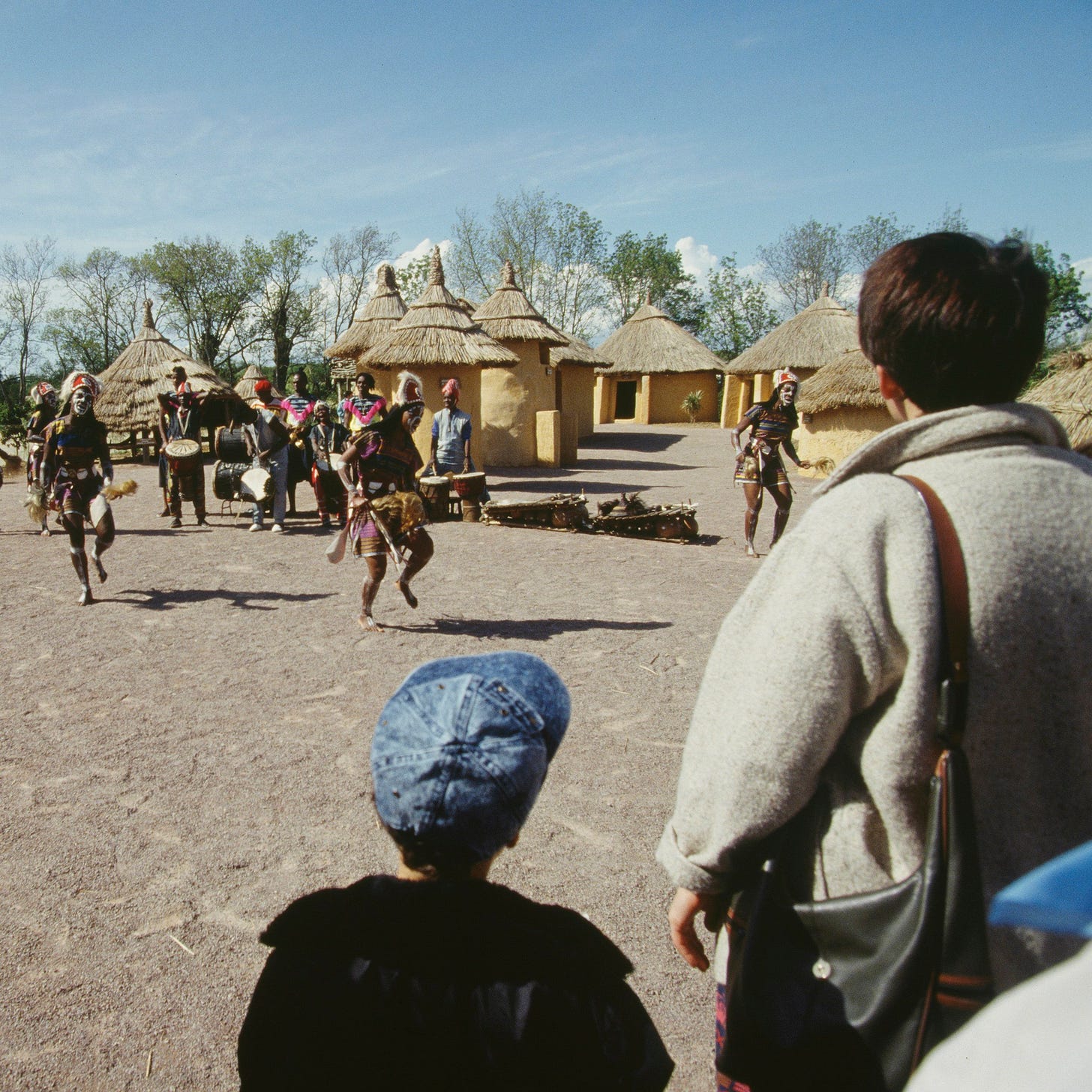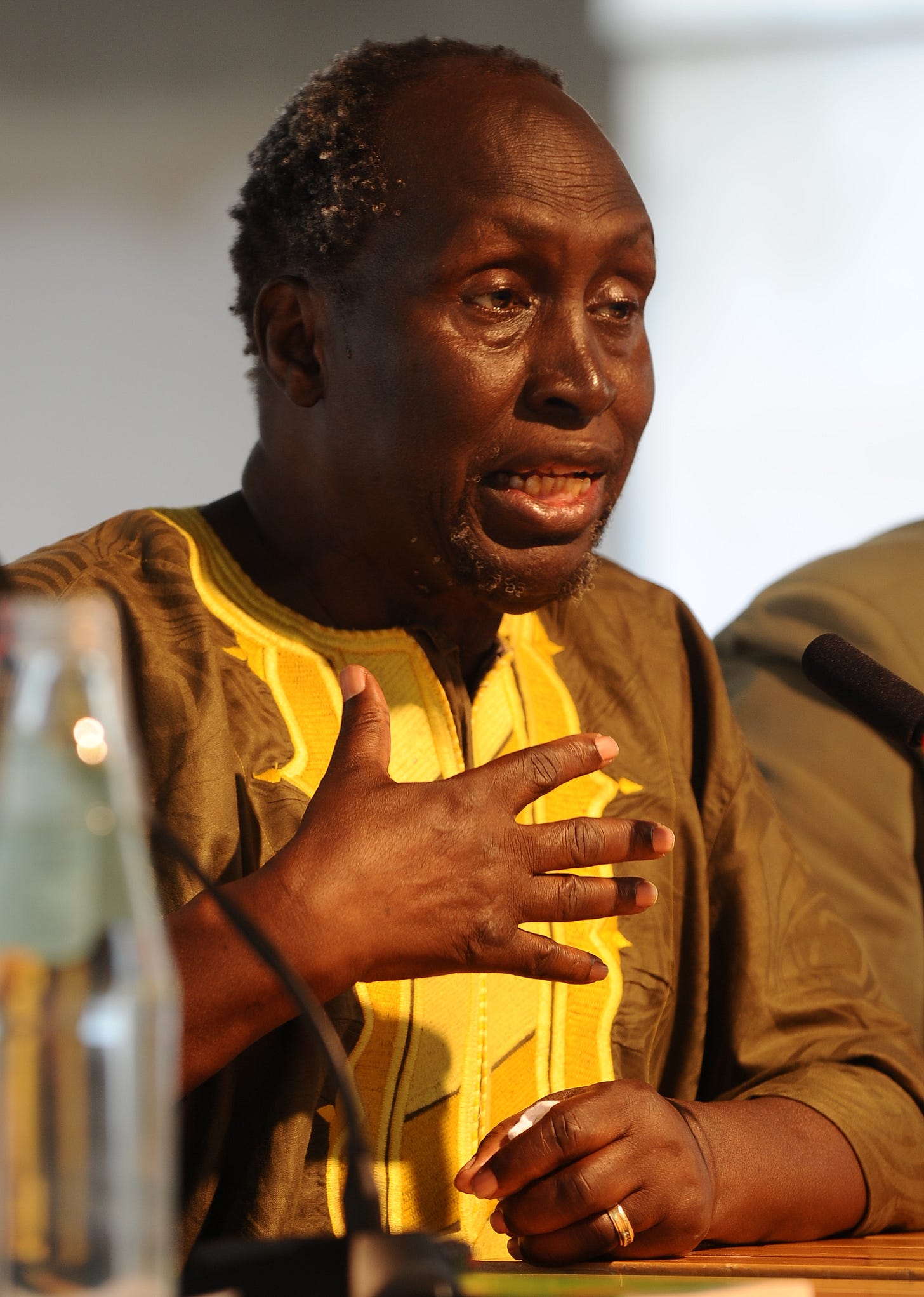
Good morning from… can you guess where? (Answer at the bottom!)
The 1994 Human Zoo in France

In 1994, French entrepreneur Dany Laurent expanded his Loire-Atlantique safari park with a new attraction: “Bamboula’s Village,” a mock Ivorian settlement named after a chocolate biscuit whose mascot was a caricatured Black boy. Fourteen members of Djolem, an acclaimed dance and percussion troupe from Côte d’Ivoire (five of them minors), were flown in to populate the exhibit.
For six months the Ivorians performed six half-hour shows a day, finishing with the N’Goron initiation dance (topless, at Laurent’s insistence) while tourists bought postcards bearing a 13-year-old dancer’s bare-chested image. The troupe slept on thin mattresses in a damp bungalow inside the park. Their passports were confiscated; their wages, well below France’s minimum, were withheld “for safekeeping.” When performers fell ill, a zoo veterinarian treated them.
Local rights activist Eugénie Bamba, disturbed by adverts showing a topless “African girl,” formed the coalition “No to the Human Reserve.” Media scrutiny followed. Under pressure, Laurent grudgingly allowed Bamba to inspect conditions; she found the troupe effectively imprisoned: “They didn’t even have the right to leave the park.”
Laurent defended himself by claiming the troupe were under Ivorian, not French, jurisdiction. But in 1997 a French court disagreed, finding Safari Africain guilty of offenses “against human dignity” and violations of labor law, including the right to freedom of movement.
For Edith Lago, the dancer who had once dreamed of France, the experience revealed a grim continuity with Europe’s colonial-era “human zoos.” “As a child you don’t see the gravity,” she said years later. “We didn’t know then what it really was.”
You can read more on this horror right here, and it is mind-boggling to remember that all of this didn’t take place in some distant colonial past, but a mere three decades ago…
Ngugi wa Thiong’o Has Died
Ngũgĩ wa Thiong’o, the legendary Kenyan author who redefined postcolonial African literature and challenged power with both pen and principle, has died at the age of 87.
Known as much for his radical intellect as his lyrical prose, Ngũgĩ’s passing was confirmed by his daughter, Wanjiku wa Ngũgĩ, who wrote: “He lived a full life, fought a good fight.” At the time of his death, he had been undergoing dialysis, though the exact cause is still unknown.
He was an icon of a man, and here’s an article we shared on him a few months back that really sheds light on his impact.
🔅 An African Icon Reflects, The Notorious Indian Brothers in Nigeria, Kenya-EU Trade Deal, India's G20 Push, and Sudan's Fragile Ceasefire
Photo of the day: Carrefour Nlongkak, Yaounde, Cameroon
Africa Migration: The Youth Exodus That Could Reshape the World

When John Uwagboe first landed in Scotland in 2008, spotting another African felt so rare it prompted a sidewalk hug-fest. Now, in 2025, Edinburgh boasts thousands of Nigerians, multiple Pentecostal church branches, and a buzzing WhatsApp group of over 3,000 members. The moral of the story? African migration is going global, and fast.
While Europe and Asia brace for a future of greying hairlines and shrinking workforces, Africa is bursting at the seams with youth. As fertility rates tank globally, Africa is the exception, with 700 million more working-age people expected by 2050.
Put otherwise, by 2030, every second new worker on the planet will be African.
Rich Countries Need Workers. Africa Has Them.
Even as nativist rhetoric gains ground from Washington to Westminster, labor demand keeps whispering inconvenient truths. Europe’s healthcare systems, America’s care homes, and global supply chains are all leaning increasingly on African doctors, nurses, techies, caregivers etc.
The UK’s care sector? Nigerian-heavy. France? Home to over 4 million Africans. The U.S.? Now the top destination for sub-Saharan African migrants, with diasporas growing fast… and thriving. Nearly two-thirds of Nigerian-Americans have college degrees, compared to just one-third of the U.S. population.
But the West isn’t the only player: Africa’s youth are also pouring into Gulf countries, China (where African students and traders abound), and returning home with newfound capital and ideas. The push factors? Lack of local jobs. The pull? Dignity, dollars, and possibility.
“Brain drain” looms large as a result, but according to The Economist, it’s not that simple. Remittances now outpace aid and foreign investment in Africa. And migration often incentivizes education at home: get the degree, get the visa, get ahead. Countries like India and the Philippines have long mastered this cycle. Some African nations are catching on, linking diaspora support to development funding, even issuing "diaspora bonds."
So, if governments in Africa can protect rights, invest in training, and cut out shady middlemen, could we be seeing one of the most transformative stories of the 21st century? Maybe. More on this here.
Food for Thought
“If you want to catch a monkey, behave like one.”
— Mozambique Proverb
And the Answer is…
The photo is taken from Harare, Zimbabwe! You can also send in your own photos, alongside the location, and we’ll do our best to feature them.






Thank you for picking up the story of this absurd human zoo in France.